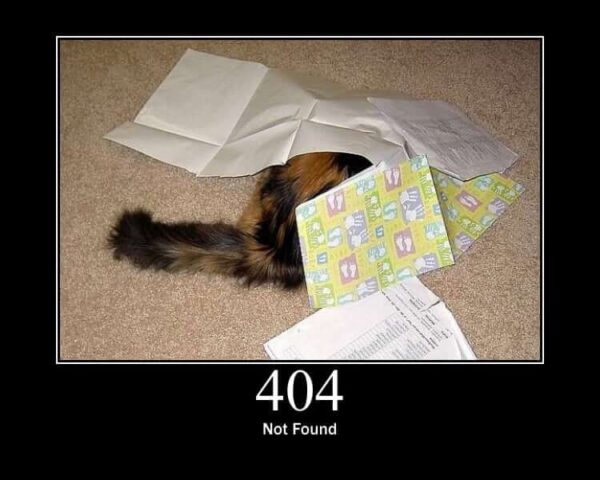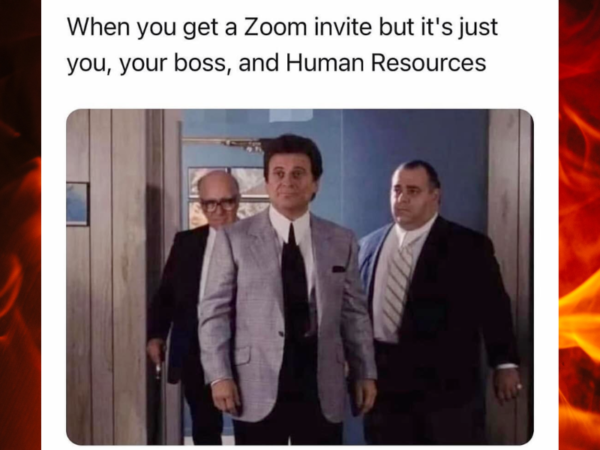Here’s an image that’s been making the internet rounds for the past couple of days:
It’s the most poignant scene from the 1990s mobster film Goodfellas, when Tommy (played by Joe Pesci), believes that he’s being taken to the ceremony where he’ll become a “made man” in the mob. In truth, he’s being taken to a quiet execution as punishment for his many, many transgressions, including killing a “made man.” At the last second — and only for a second — he realizes the true purpose of the meeting, after which he takes a bullet to the head.
Here’s the relevant bit [content advisory: swearing, a guy taking a bullet to the head]…
At this point, you may be wondering: What are the signs that I’m about to be laid off? Here they are, broken down into three categories for your convenience:
- Signs you’re about to be laid off in the next hour
- Signs you’re about to be laid off in the next 24 hours
- Signs layoffs are coming in days or weeks
1. Signs you’re about to be laid off in the next hour

The last-minute high-priority meeting
Back in April 2020, when COVID-19 was picking up steam and the shutdowns were extending beyond the initially promised two weeks, I got an email with these particular qualities:
- It was a last-minute invitation to a Zoom meeting…
- …and it was scheduled very shortly after the start of the working day
- It had vague name — “Special meeting”
- There was no agenda
- The guest list was hidden

My first thought was “that seems ominous.” At the time, I’d been laid off three times before, and my “Shenanigans Sense” was tingling.
If you’re suddenly invited to a meeting like this, the odds are pretty good that you’re about to be laid off.
The general consensus among HR people whom I’ve talked to on the topic is that layoff meetings should be scheduled with as little advance notice as possible. They’re typically held as early in the day as scheduling and other issues will allow, and preferably not before a weekend or holiday.
Why are layoff meetings announced only at the last minute? It’s to harness the element of surprise, which helps blunt any angry or resentful reaction from employees, and the shock tends to make some people a little more pliant.
To return to my story, I joined the meeting at the appointed time and was greeted with this (even then, I had the presence of mind to take a screenshot):

I decided to test a theory and click the “Start Video” button. My video came on for a couple of seconds, after which it was quickly deactivated by the meeting moderator, who sheepishly said “Uh…we’re going to hold this meeting without video. And everyone but the organizers will be on mute.”
That’s when I knew we were getting laid off.
This was the general layoff announcement. During this meeting, we were told that each of us was scheduled for a fifteen-minute meeting sometime that day. We’d get more details about our layoffs on a one-on-one basis.
Speaking of those fifteen-minute meetings…
Your manager’s calendar for the day is a series of fifteen-minute meetings
If you have access to your manager’s calendar, see if there’s a day full of fifteen-minute one-on-one meetings with members of your team. The odds are better than even that they’re layoff meetings.
If you’re invited to one of those meetings, start working on your resume.
2. Signs you’re about to be laid off in the next 24 hours
Certain subscription services that you use for work are suddenly unavailable

The night before my most recent layoff, I was taking the initiative and editing a tech article that a coworker had asked me to review as a last-minute request. It could’ve waited until morning, especially since I was still jet-lagged from a recent trip, but I was going the extra mile to support the team, for what little good it would do me.
That’s when I noticed that one of our mainstay tools, Grammarly, wasn’t available. I tried re-logging into Grammarly, but my account wasn’t working. I quickly filed a ticket with Support and called it a night.
The next day, I experienced the 15 worst minutes of 2024 (…so far!) and was laid off.
While a company can quickly cut off employees from systems that they administer, it takes longer to cut off employees from third-party systems and subscription services. This means that they have to cut off your accounts some time in advance, which can give you a little heads-up that you’re about to be laid off.
Your manager suddenly cancels a regular one-on-one meeting or suddenly becomes quite unavailable or eerily silent

If this happens, it may be because you’re about to be laid off, and the standard HR guidance for layoffs is to minimize contact with those about to be laid off.
I’ve seen a variation on this theme where managers have more frequent one-on-one or team meetings, and then suddenly stop.
Watch for other signs that layoffery is afoot.
A seemingly low-priority task suddenly becomes high-priority and has to be completed in the next couple of days

This happened to me a while back. A manager asked me to update some documentation that while useful, could’ve gone without an update for a couple of months without anyone really caring. It was on my list, and I could have done the update in a day or two, but there were a dozen or more higher-priority items.
“But it really needs to be done by the end of the week!” my manager said.
I said “Sure. I can finish it by end of day Friday.”
“Could you do it sooner?”
“Friday is the end of the week, which is when it needs to be ready.” I replied.
“Could you do it by say, Wednesday?”
That’s when I knew.
(It’s also when I decided I wasn’t going to start that task until Thursday, just in case.)
Coworkers mention an upcoming all-hands and you haven’t been invited to it
I don’t have to explain this one, do I?
3. Signs layoffs are coming in days or weeks

Here’s a list of fairly reliable indicators that layoffs are happening in days or weeks. One of these alone might not be enough of a sign, but if you see three or more of these, keep your guard up…
- The company issues the dreaded “Return to Office” mandate for anyone within “reasonable distance” of an office (typically 30 – 50 miles).
- You are asked to write up a definition of your role and explain just what it is you do at the company. Doubly so if you’re asked to do so by consultants like “The Bobs” from the film Office Space.
- Upcoming expenses or travel that have already been approved are suddenly un-approved.
- An executive somewhere in your chain of command suddenly departs with little fanfare.
- The following phrases were mentioned more than once in the most recent all-hands meeting:
- cost-cutting
- finding efficiencies
- headwinds
- challenges
- investor pressure
- When someone says “there are no plans for layoffs” at the most recent all-hands meeting.
- The company recently underwent a merger or acquisition, and as a result, one of the companies was “saved.”
- The company has put a freeze on hiring, and its “Careers” page is suddenly empty.
- There’s also a freeze on promotions.
- Constant reorganization of teams.
- You notice that some departments are absorbing other departments.
- More than a few people are PIPped or let go “for performance reasons.”
- One or more big products or programs has been recently canceled.
- Projects are handed over from full-time employees to contractors.
- The company posted big losses in the most recent quarter, or has been consistently losing for 3 or more quarters.
- Contractors aren’t renewed.
- 401(k) contributions are reduced or removed entirely [US-specific].
- The company cuts some minor perk or benefit “so they don’t have to lay people off.”
- A wave of senior people retire.
- You are asked to adopt some kind of automation of AI and adapt to its regular use.
- The company opens a branch in a country that is known for offshore work.
- The CTO departs because they want to “get back to their roots,” get into “the next phase of their career,” or “spend more time with their family.”
- If you work at an office: you start seeing extra security staff.
- A team that you interact with is outsourced completely.
- Health insurance/vision/dental/prescription medication plans are changed to cheaper, worse ones [US-specific].
- You were once “in the loop,” but lately, you have little idea of what’s going on in the organization.
- Outside consultants start popping up. Even worse if they’re MBAs.
- Payroll is more than one-third the size of gross revenue (this will take a little research).
- A private equity firm has invested in your company.
What to do if you realize that you’re about to be laid off

ℹ️ I wrote about this in the first article in this series, but it’s worth repeating for those of you who are new.
Do whatever it takes to steel yourself for the bad news. Whether it’s deep breathing, counting to ten, reciting your personal mantra, or firing up your “poker face”, you want to get ready to conduct yourself at the meeting with as much grace, aplomb, and professionalism as you can muster.

You’re about to be in the second most important meeting you’ll ever have at this job. (In case you were wondering, the most important one is the job interview.)
If you work for a decent company, there’ll be one or more follow-up calls, and they’ll be face-to-face. Depending on the size of the company, it might be just your manager or your manager, some other management people, and HR.
No matter what you’re feeling at the meeting, you want your termination to be as good a breakup as possible. This means that you must handle it professionally.
The way you behave at this meeting will set the tone for your departure. If it is full of bitterness, acrimony, and the gnashing of teeth, they won’t be inclined to do you any favors. On the other hand, if you conduct yourself with grace and decorum, you may gain some extra concessions and a willingness on their part to do what they can for you.
If you can remember these questions through the stress of the meeting, you should ask questions like:
- When is my last day?
- What is my severance package?
- What about my bonuses, ESPP, RSUs, and other non-salary compensation?
- How long will my insurance coverage last? (This one’s a big deal in the United States, less so in other OECD countries.)
- When do I have to return the company laptop and other gear?
- What arrangements are being made so I can collect my stuff from the office?
- What do you want me to do with my current projects and files?
- Can I get a letter of recommendation and use you as a reference?
Don’t worry about memorizing these questions — just remember that you should leave the meeting with a clear idea of what they expect from you and what you can expect from them.
When they send you papers to sign, do not sign them immediately. You’ll be given time to look them over. Don’t look them over just yet.
Walk it off
Your first instinct might be to immediately take all the standard job search actions the moment after you’ve been laid off. Fight it. You need a little time to deal with what just happened.
This is going to sound terribly woo-woo new-agey, but I’m going to say it because it’s an important step: at your first opportunity, get away from whatever you’re doing, get out and go for a walk. Physical activity is a key part of this step, so don’t get into a motorized vehicle. You want to get moving, and you want to do it outside, preferably in your own neighborhood.
The walk is important because it gets you away from anything work-like and gives you a chance to clear your head. It gives you a chance to come down from one of the most stressful experiences you’ll ever face in your working life and come to terms with what’s happened. It is not the time for figuring out what your immediate next steps are. It’s the time to collect yourself so that you’re in a better position to figure out what your next steps are.
Don’t do the walk in a fugue state. Take note of your surroundings. Chances are you’ll see things that you passed by every day but never noticed before. This is good, because it’s preparation for what you’re going to be doing for the next little while: seeing things differently.
As for the next steps? I’ll cover them in the next article in this series.
Also in this series…
- Laid off in 2024, part 1: The 15 worst minutes of 2024, followed by 15 more
- Laid off in 2024, part 2: First referrals and blue dragons
- Laid off in 2024, part 3: How are you doing?
- Laid off in 2024, part 4: Make the Year of the Blue Dragon YOUR year!
- Laid off in 2024, part 5: The next two weeks
- Laid off in 2024, part 6: The separation agreement / Money, money, money
- Laid off in 2024, part 7: Join me on “Surviving a Layoff” this Wednesday!
- Laid off in 2024, part 8: Step one — get a box…
- Laid off in 2024, part 9: The box came back, the very next day…
- Laid off in 2024, part 10: Unearned consequences
- Laid off in 2024, part 11: The dreaded non-disparagement clause
- Laid off in 2024, part 12: Lessons from “The Martian” and other notes
- Laid off in 2024, part 13: One day, in retrospect, you’ll remember this time as beautiful
- Laid off in 2024, part 14: No stigma, no shame
- Laid off in 2024, part 15: Q-TIP, or Quit Taking It Personally

3 replies on “Laid off in 2024, part 16: Signs that you’re about to be laid off”
Great article — this is turning out to be quite a series. I’m going to add one more for your third list: that annual raise you’ve been getting? It didn’t happen this year? Brace for impact.
When I was laid off at Sobeys (corporate) my manager and I pretty much knew layoffs were coming for a few years – we just didn’t quite know when. The company had made a decision at some point to sell most of their marketing department to a third party – leaving only the top-line decision making in-house, and a very small number of supports. In order to accomplish this they did the following:
– a new director was hired who was parallel to our current director but who replaced him within two years. this new director previously worked for the company that would eventually take over our marketing function.
– the company introduced a new digital asset management tool (created by that company) that we would all use that took almost two years to fully integrate. we were laid off within a month of the last milestone.
– our semi-annual teambuilding activities included a day-long session hosted by Second City Improv coaches that essentially were teaching us interviewing skills – “getting to YES” and confidence inspiration.
– at one point around four months before the layoff was announced we had individual sessions with a consultant who was to help us beef up our LinkedIn profiles – with a very thin excuse that the company wanted to use it internally..
– we did annual “what is it you actually do here” surveys that got progressively more granular.
– when the layoff came we were given 24 hour notice of the essential meetings. it was horrible, the waiting. I didn’t sleep the whole night.
– when the actual meeting occurred I just went in, took the package and walked out without saying anything more than thanks. I had to work for another three weeks to my termination date. others had to work for several months. the package was quite decent and I wasn’t unhappy with it at all. by the point the layoffs actually happened everyone in the department was sour to the point of derision given how much obvious preparation the company had inflicted on us in the years leading to the actual transition.
– the director who oversaw all this was let go by Sobeys within a year of the transition. I’m sure she’s now off somewhere priming another company for a similar horror.
Another one: the DEI report includes you as a women/minority/other marginalized group on the exec team; then the next day you are called in from your vacation, expecting a chat about earning equity in the company, but see a large orange envelope on the boardroom table. Those DEI numbers go from 2 out of 11 (18%) to 1 out of 11 (9%) overnight.